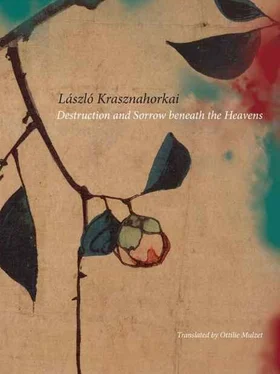The first monastery which they reach could be any of the renowned temples they identified on the map earlier, but it isn’t, it seems to be one of the buildings of lesser importance, even if in terms of its beauty it is certainly the equal of the others, hence they would like to know its name, as soon as they walk in they address a dozing young monk but they don’t understand his reply, he is speaking in a regional dialect which the interpreter cannot translate, so they just smile at one another and have a look around the temple which is clearly under reconstruction, everywhere there is scaffolding and tools and carpenters’ benches, and ladders and beams and shavings, but no work is going on, and they cannot see any workers, so perhaps no work takes place in the fog? — Stein tries to joke with the monk but he doesn’t understand what the interpreter says, just as the foreigners don’t understand him when he replies, so that there remains only the wordless looking around in this extremely rare interior space among Buddhist shrines; the interior of the shrine is extraordinarily elevated and, what is even more surprising, the structural supports of the ceiling are not the usual densely placed thick cedar columns and complex system of brackets but a system of vaults below the roof, in a distinctly European style which causes the space to be open, nearly monumental, and what is most important and most unusual is that in this way the ceiling can be seen , and the gaze drawn as much upward as towards the altar — where there is now an empty lotus throne, visibly under restoration, the Buddha is nowhere, so that, as they courteously extend their business cards to the young monk, they make an attempt, despite the difficulties, at a new question, and to their great surprise the young monk seems to understand what they want: all his previous confusion suddenly turns into the most sincere cordiality and helpfulness, he motions for them to follow, and holding the cards delicately between his fingers as he walks, he slips them into a concealed pocket in his yellow robes, leading them with agile steps to one of the far corners of the shrine, indiscernible before in the nearly complete darkness looming within, he points to a colossal thing covered by cheap canvas, he points to it, he explains something and, as if they had rebuked him, suddenly conducts himself with inexplicable respect, he bows to Stein, then he lifts up one of the corners of the canvas — the guests help so as to be able to see what lies beneath — and beneath the canvas, the boy shows them, almost glowing with pride, is a completely new statue of the Buddha, they gesture to him, could he remove the canvas entirely, and from this point on it’s as if he understands everything, already he is fulfilling their request, the canvas comes off, and there sits a huge, brand-new Buddha, a Buddha next to which every other Buddha they have seen until now seems merely new-made, exasperatingly soulless, primitive, shoddy — it is beautiful, sublime, exactly the kind of Buddha in which a believer can truly find the Buddha, and this beauty strikes them so unexpectedly, they are really seeing Shakyamuni Buddha,[4] that they can’t speak, the boy is radiant, and the interpreter tries to encourage Stein and looks at him and waits for him to indicate what should be translated.
Stein doesn’t really know what to say, indeed, because of the strength radiating from the Buddha, as yet unpainted, unvarnished, ungilded and, judging by the fragrance, prepared from sandalwood, even later it is hard for him to speak, so the interpreter tries to initiate some kind of conversation, from which — as is explained a few minutes later — it turns out that the statue was made here, in Jiuhuashan, because there is a workshop here, and in this workshop is an expert woodcarver who makes Buddhas, well, he made their statue, the boy, his face radiant from joy that the statue is so pleasing to the two foreigners, points to somewhere outside, clearly to where the workshop is, with its Buddha-carving master, but they are already returning to the table near the entrance where the boy had been dozing before, and they spread out a piece of paper so that he can sketch for them where this workshop is, of course they can’t understand the drawing, they don’t know where they are, or what is where, generally speaking; they look at the clumsy but basic sketch, upon which the name of the place is also written, so that if necessary they can show the drawing to someone, they nod as the boy, his finger following the lines he has drawn, explains again and again where they need to go, how they can find the workshop, then, bowing, they thank him warmly for his help and make their way outside, but then he indicates that they should wait, and he runs off somewhere, returning a minute later with a tiny little bundle of gifts, two books from the Chinese translation of the Lotus Sutra,[5] a small tourist publication about Jiuhuashan, two tiny statues of the Buddha carved out of soapstone and tapes of Buddhist prayers in decorated boxes, one for the interpreter and one for Stein — presumably this is everything that the boy has, and now by all means he wants to give this everything to them, as they stand there in the doorway they are at a loss, because they see the kind monk finds even this to be too little, he would like to give them something. . or tell them something, he tries to find the right words, he tries, in his dialect, to speak the language of Beijing so that the interpreter can understand, but it doesn’t work, it could be some important advice, or reassurance, or warning, but it is impossible to make out the essence, the interpreter just shakes his head, and now Stein tries with all his strength to help the interpreter by how he is listening and looking, because the whole thing is as if the monk were trying to warn them about something — but of course this is just guesswork, they don’t understand anything, they bow to one another with ritually folded hands, they bid farewell to one another, and finally they step out through the gate of the temple into the eddying nothingness, the touching gifts in their bags, and that colossal, unvarnished, unfinished Buddha beneath the canvas with his own unforgettable sublimity in their memories — the boy is at the gate, he bows and waves until he finally disappears in the fog, but until the end it was as if somehow, just somehow, he wanted to tell them something very important.
They are to the south of the Yangtze, and, really, they dressed for the weather in this region as it should be in May, that is, sandals, one in a light linen shirt and the other in a T-shirt, so that they froze on their journey, and now, when they step out again into the cold rain, only a few hundred metres along the water-slick steps is enough for Stein to see that the interpreter, the student from Shanghai who selflessly, out of sheer benevolence and enthusiasm for this topic, joined Stein on this trip, is shivering from head to toe. We really need that raincoat, says Stein reassuringly, and the warm things too, he consoles him, so let’s go back: they decide to somehow find the path leading down to the main street, so that they can buy something. Logically, they decide upon the row of steps at the first crossing leading downwards, but it soon emerges that there is no sense in making decisions like this, as the stairs really do head downward for a while, but then, as if having thought things over, after a bend head upward once more. And that’s how it goes from this point on, the path heads down, the path heads up, then down again and up again, they wander here and there, they come to newer and newer crossings where they have to make a decision, and they continually make bad decisions, or now for them there is no such thing as a good decision, because even the advice which they ask for and they get from the people on the path doesn’t help, these people who — tourists like them, or pilgrims — smile and gesture: just keep going, they wave and nod that it’s good, perfect, they could not possibly be going in a better direction, just keep going, they chirrup gaily, but Stein and the interpreter don’t even know if they understand where they are trying to go, because they tried to explain through gesticulations that — even now! — they are not looking for this or that monastery but the village, where they would like to return, at which the warmest reassurance is always given, that, yes, this is exactly the right path, they should just keep going, just keep going, just keep pressing on ahead, and they will be there in no time at all, no cause for any concern — and after a few steps the passers-by cheerfully disappear once again into the fog.
Читать дальше












